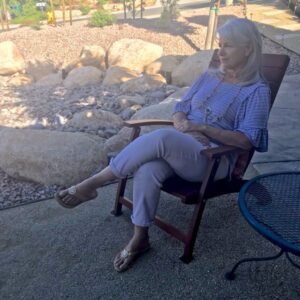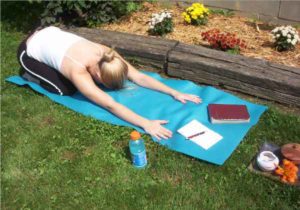 Adapted from The Soul at Rest by Tricia McCary Rhodes. Released November 6, 2018 from NavPress. Copyright © 2018. Used by permission of NavPress and Tyndale House Publishers, Inc. All rights reserved.
Adapted from The Soul at Rest by Tricia McCary Rhodes. Released November 6, 2018 from NavPress. Copyright © 2018. Used by permission of NavPress and Tyndale House Publishers, Inc. All rights reserved.
Publisher’s Note: Those who truly find their place with a fit lifestyle, know that beyond eating healthy and exercising well, the physical body needs rest and restoration. The soul too needs rest – a time to be quiet and connect with the Spirit of God. Tricia McCary Rhodes outlines a practical foundation on which you can build your prayer time. I join with her in encouraging you to make it a DAILY practice. Beyond that, a healthy prayer practice can prepare you for weekly spa time – a Sabbath of sorts that can give you a longer and more comprehensive spiritual massage and exfoliation. Both daily prayer and weekly spa care give you consistent spiritual preparation for the special ‘thin places’ of an occasional fitness retreat. Together they help you tell the REST of your story.
Something in each of us is drawn to the transcendent, to experiences that transport us, even for a moment, from the ordinariness of life. We find ourselves strangely affected at random times—a waterfall takes our breath away or majestic worship moves us; the beauty of birdsong beckons or the wind in the trees seems to whisper our name; we tear up at a mother caressing her newborn or feel inexplicably calm as the sun sets on the horizon; a well-worn liturgy heals our wounds, or a holy hush engulfs us as we pray. Like quenching a thirst we didn’t realize we had, these things both satisfy us and make us long for more.
Ancient Celtic Christians used to call these thin places, a metaphor that described their sense of heaven touching earth, of God breaking through the thickness of our daily lives to make himself known. While they identified specific locations where they felt this was more common, they also believed that thin places were all around, if only we had eyes to see.
This is a package of tools to deepen your walk with God.
A PASSION – EMBRACING THE ONE THING
The sheer volume of activity that fills most of our days is mind-boggling. We juggle demanding careers, family responsibilities, religious activities, and community involvement. The moments of our days are programmed—from sports practices to piles of laundry, from business trips to gym workouts, from Bible studies to hanging with our neighbors—we are very busy people. I don’t know about you, but for me, at times it feels as if life itself is closing in, almost like I’m gasping for air.
 Jesus is inviting us to one thing—to make space for him amid our busy, chaotic, overpacked lives. God wants to fill us with passion to know him—this is our destiny as his followers. Nothing else compares —not what we understand or how powerful, successful, or financially secure we are—just knowing him. That’s it.
Jesus is inviting us to one thing—to make space for him amid our busy, chaotic, overpacked lives. God wants to fill us with passion to know him—this is our destiny as his followers. Nothing else compares —not what we understand or how powerful, successful, or financially secure we are—just knowing him. That’s it.
Spend a few minutes becoming quiet before God. Breathe deeply, thanking him for his love and commitment. Take a few minutes to connect with the quiet, being sensitive to whatever discomfort this might bring up for you. Offer yourself as you are, a living sacrifice, letting God guide you as you engage in this practice.
THE TIME – SET AND REASONABLE
We all struggle when it comes to this gritty discipline of making prayer in solitude a part of our regular schedule. This, then, is where we must begin our pilgrimage—with a set time of day and a consistent length of time for prayer.
When should we spend time in prayer? Does the time of day matter? This is a decision you alone can make.

I prefer the early morning for several reasons. First, it enables me to recalibrate my heart so that I am more aware of God’s presence and perspective throughout the day. Second, when prayer is the first thing I do, other things can’t as easily crowd it out. Although I try to commune with God throughout the day, I want my first moments to be his, to hear Jesus before all the other voices that clamor for my attention.
Another time may work better for you. We all experience seasons of life where mornings just won’t work. Jesus went away in the night, middle of the day, and early-morning hours to be alone with God. The important thing is to find a time that works on a regular basis and stick with it. Our nature adapts to consistency—the neural pathways in our brains deepen with the habits we keep, making it easier to follow through with less effort.
How long should we pray? The amount of time we decide to spend with God is relative, depending on our outlook. If we are duty-driven or see ourselves as fulfilling some religious obligation, no matter how short the amount of time we spend, it’s going to feel burdensome.
If, however, we can grasp that prayer is a privilege and a grace, the question shifts. We look forward to the privilege of being with God and ask for grace to grow right where we are at. Thus, if you have been having quiet times for years, you may want to press into longer seasons of solitude. If this is something new or you have struggled to be disciplined in this area, just set a reasonable goal and ask God to enable you to follow through.
THE PLACE – PREPARED AND SECLUDED
As a child, I remember my father shutting himself in the bathroom—the only room in the house with a lock on the door—to escape five noisy kids and be alone with God. In my teen years, when things were quieter, I often awoke to find him sitting by himself at the kitchen bar, perusing his open Bible as he drank his coffee and ate his toast and honey. That image is imprinted on my heart to this day, reminding me that we can always find a place to pray.
 On a practical level, the greater our preparation, the easier it will be to slip into a prayer posture. For decades now, I have spent time with God each morning in the corner of my living room, looking out to the street. Because the family doesn’t hang out there most of the time, the room is usually free of the clutter that would make me want to jump up and clean instead of settling in. Beside me, a basket holds my Bible, journal, devotional materials, sketch book, colored pencils, and notecards. Worship music on my smartphone, a cup of coffee in hand, I nestle into those cozy pillows, drawn to that spot day after day like an old friend.
On a practical level, the greater our preparation, the easier it will be to slip into a prayer posture. For decades now, I have spent time with God each morning in the corner of my living room, looking out to the street. Because the family doesn’t hang out there most of the time, the room is usually free of the clutter that would make me want to jump up and clean instead of settling in. Beside me, a basket holds my Bible, journal, devotional materials, sketch book, colored pencils, and notecards. Worship music on my smartphone, a cup of coffee in hand, I nestle into those cozy pillows, drawn to that spot day after day like an old friend.
I have shifted my place of prayer over the years, depending on my family situation. From my bed, to my home office, to an office away from the house, and back to my favorite living-room couch, my goal is always to do whatever I can to shut out distractions.
Jesus tells us to close the door. By doing so, we affirm we want to be alone with him, that nothing else matters for these few minutes. For most of us, this also means leaving behind our smartphones and tablets, turning off the television or anything else that might compete for our attention.
There are many other special places for time with God. For me, walking on the beach and hearing the waves crash gently on the shore nourishes my soul like nothing else. Nature is always putting God’s glory on display and can draw us into his presence in powerful ways. Some studies even show that spending time outdoors near water, which scientists call blue space, changes the structure of our brains, relieving stress and infusing us with fresh perspective. While we don’t all live in a place where we can do this daily, we can make special plans to hang out with God immersed in his handiwork—a few hours, an entire day, or even a weekend—just as we might plan a rendezvous with someone we love.
THE PLAN – ANTICIPATE, ACKNOWLEDGE, ACCLIMATE
There are three ways we can be intentional in preparing our hearts and minds for a meaningful time of prayer—anticipate, acknowledge, and acclimate.
Anticipation alters the way we approach our practice of prayer. As we consider that God is coming to see us, our hearts are aroused. When we know he awaits with arms laden with gifts that can change our lives, our desire for him increases. This simple awareness can alter our entire outlook on prayer, once we really see it.
I can easily find myself well into a time of prayer before I realize I haven’t connected with God’s presence. Chatting away in my own mind, I forget that this is meant to be a two-way conversation. Even after decades of practicing prayer, it is helpful for me to begin by acknowledging that God is with me. I may say something like: I believe you are here God. Thank you for meeting me where I am right here and now. I come just as I am.
 There are things we can do to help create a quiet heart. First, be comfortable, but not too comfortable. In Scripture, people bowed, stood, lay down, sat, or knelt when praying. There’s nothing spiritual about any one posture. Try different things until you discover what requires the least thought and enables you to relax while remaining in a spirit of prayer. Second, close your eyes and slow the pace of your mind. Take deep breaths, concentrating on relaxing your body. Breathe in God’s life, light, and peace, and breathe out your stresses, distractions, and fears. Breathe in God’s love, forgiveness, and compassion and breathe out your sins, failures, and frustrations.
There are things we can do to help create a quiet heart. First, be comfortable, but not too comfortable. In Scripture, people bowed, stood, lay down, sat, or knelt when praying. There’s nothing spiritual about any one posture. Try different things until you discover what requires the least thought and enables you to relax while remaining in a spirit of prayer. Second, close your eyes and slow the pace of your mind. Take deep breaths, concentrating on relaxing your body. Breathe in God’s life, light, and peace, and breathe out your stresses, distractions, and fears. Breathe in God’s love, forgiveness, and compassion and breathe out your sins, failures, and frustrations.
Many people feel guilty when prayer lulls them to sleep. Try to be well rested when praying, but if you fall asleep, remember you are in God’s arms, loving him even as the Spirit continues to pray on your behalf—you have not failed.

ATTITUDE AND ACTION
Seeing my time with God as a reflection of my great need rather than proof of my spiritual prowess has altered my prayer life dramatically. I come to him as a child, in awe that he has chosen me and that no matter how often I get things wrong, he delights to be with me. This perspective makes prayer incredibly doable day in and day out.
For me, meeting with God in the morning is as indispensable as eating or taking a shower—I don’t even have to think about it. Developing the discipline of prayer in solitude is no easy thing. It takes months and sometimes years for us to become habituated to the inner prayer journey. But we must begin somewhere, with a decision to put in the time, resting in the knowledge that grace—God’s enabling power—will do what we cannot do.

PRACTICING PRAYER – AT WATER’S EDGE
What is your plan at this point? Ask God to reveal any hindrances to keeping your intention regarding prayer. Confess your complete dependency on him.
When you are ready, write out your clear intention about spending time alone with God. This should reflect your personal desires and a realistic goal for the inner prayer journey. Feel free to use the one below for your prayer journal.
Signed____________________
Date____________________
 Get more from Tricia McCary Rhodes. Her book the SOUL at REST is perfect for your prayer and spa time or your church small group fitness retreats.
Get more from Tricia McCary Rhodes. Her book the SOUL at REST is perfect for your prayer and spa time or your church small group fitness retreats.




